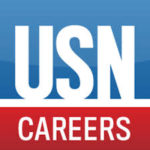 The more research you’ve done, the better the interview.
The more research you’ve done, the better the interview.
 As seen in U.S. News | January 31, 2017
As seen in U.S. News | January 31, 2017
Ask any hiring manager what helps a candidate stand out in the interview process and they will confirm the importance of preparation. While you can’t change your previous experience, your education or your overall skills shortly before an interview, you can excel in getting yourself ready before the big meeting. Here are four effective things to do. First, create a written comparison of your qualifications to the job description. I call this a “T Resume” – where you prioritize the top five to seven requirements on the left and then succinctly list how you have these requirements to the right of each one. To really maximize the benefit of this exercise, start by writing everything that comes to mind. Once you have a complete list, now refine it to one to two sentences that answer the question: “If I need someone who can perform a certain task, explain to me how you are the best candidate.”
The best answer to that question is not just a list of everything you have done related to that subject. It involves communicating the most relevant examples that are of interest to this specific hiring manager. In focusing on relevance and transferability, you have a better chance of showing how you are the best candidate, not just a qualified one. Additionally, customizing your response displays how well you understand the role.
Second, move beyond the job description. Exemplary candidates can confidently address how their background is a match for the role, but they can also speak to how this role impacts the larger organization. Every role in a company solves a business problem or provides a specific value to the company. The size and complexity of the problem that is solved or the value that is provided usually ties to how much compensation the company will offer. As a competitive interviewee, you should clearly understand what problems you will solve and what value you will deliver.
Third, think like an investor. If you are serious about building a career at this company, research like an investor. You can start by checking out their “Investor Relations” page online if they have one. You can also look up analysts’ thoughts on the industry, trends in the future and overall outlook for the business or service. Furthermore, look into top competitors, companies that have failed and any other catalysts (like changes in regulations or laws) that may have a potential impact.
Putting on your analytical hat can accomplish many things. Initially, it can strengthen your conviction that a specific company is the right place for you. Additionally, it can deepen your knowledge of the opportunities and challenges ahead in this field. Finally, it gives you significantly more interesting talking points and questions than the overused, “Tell me about a typical day,” and, “How do you train new employees?”
Finally, phone a friend. Whenever possible, try to identify if you know someone who works at the company. Even if that contact is not in your ideal department, she can still give you an insider’s view of the culture, organizational structure, hiring process and companywide goals or objectives. If the contact is a friend or you have a close relationship, you can simply call or email to ask if she can give you some advice.
When the best contact is more removed from your everyday circle, you should strategize on the best way to get a quick response. Do you share a mutual friend who could call in a favor to get a quick response? You can also send a politely worded direct email (if you have the email address) or via an InMail on LinkedIn. Highlight that you have a time-sensitive advice request so that you can better prepare for an interview with X company. Include a few times when you are available, how much time you think the call might take (10 to 15 minutes is more likely to get a response than 30 minutes) and your best contact information. And, of course, express your sincere appreciation for any assistance and your willingness to return the favor.
In summary, interviewing is stressful and often grueling, but there is much you can do to improve your performance. Expertly preparing before a meeting is one of the simplest things an interviewee can do to raise his or her chances for success. Start with a strong command of your value, followed by a deep knowledge of the role and the overall business, and you will be in excellent shape to ace your interviews.
